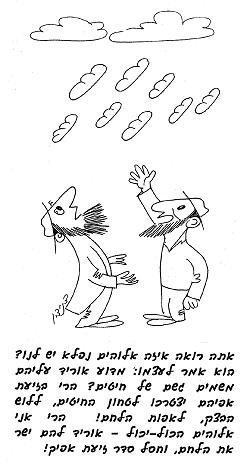
After the counting of the Omer is finished on the fiftieth day, one must bring the first wheat to the Holy Temple and bake from them two loaves of bread. This wheat had to have grown in the Land of Israel, but if they grew outside the Land of Israel they are not suitable, for it is written in the Torah “from your dwelling places [the Land of Israel] shall you bring two loaves of bread as an elevation offering; each shall be made of two-tenths of a measure of choice flour, baked after leavening, as first fruits to the Lord” (Leviticus 23:17). The Sages asked: What is the rule if the clouds rained wheat? Is this wheat considered as the fruit of the Land of Israel or as the fruit of foreign lands? The scholars asked if is it possible that the clouds should rain wheat. The Sages answered: There is such a possibility; once a great quantity of wheat fell from the clouds onto an Arab’s field. (This question is not decided in the Talmud, so Maimonides ruled that it is best to bring the first fruits from wheat which grew upon the land, but if one brought wheat which fell from the clouds it is permissible post facto — Maimonides, Laws of Daily and Supplemental Sacrifices 8:3).
(Babylonian Talmud, Tractate Menachot 69b)
The Talmudic text:
R. Zeira asked: If wheat fell with rain, what is the law? What does he ask about? Surely, he does not ask whether or not it is permissible for menachot — there is no reason to disqualify it! He asks whether or not it is permissible for the two loaves, they must come “from your dwelling place,” and that might exclude areas outside the Land of Israel, but permit that which came from the clouds, or it might be literal, excluding also that which falls from the clouds. Would this ever occur? Yes — a case occurred in which a field three parsaot long was covered with a tefach of wheat.
